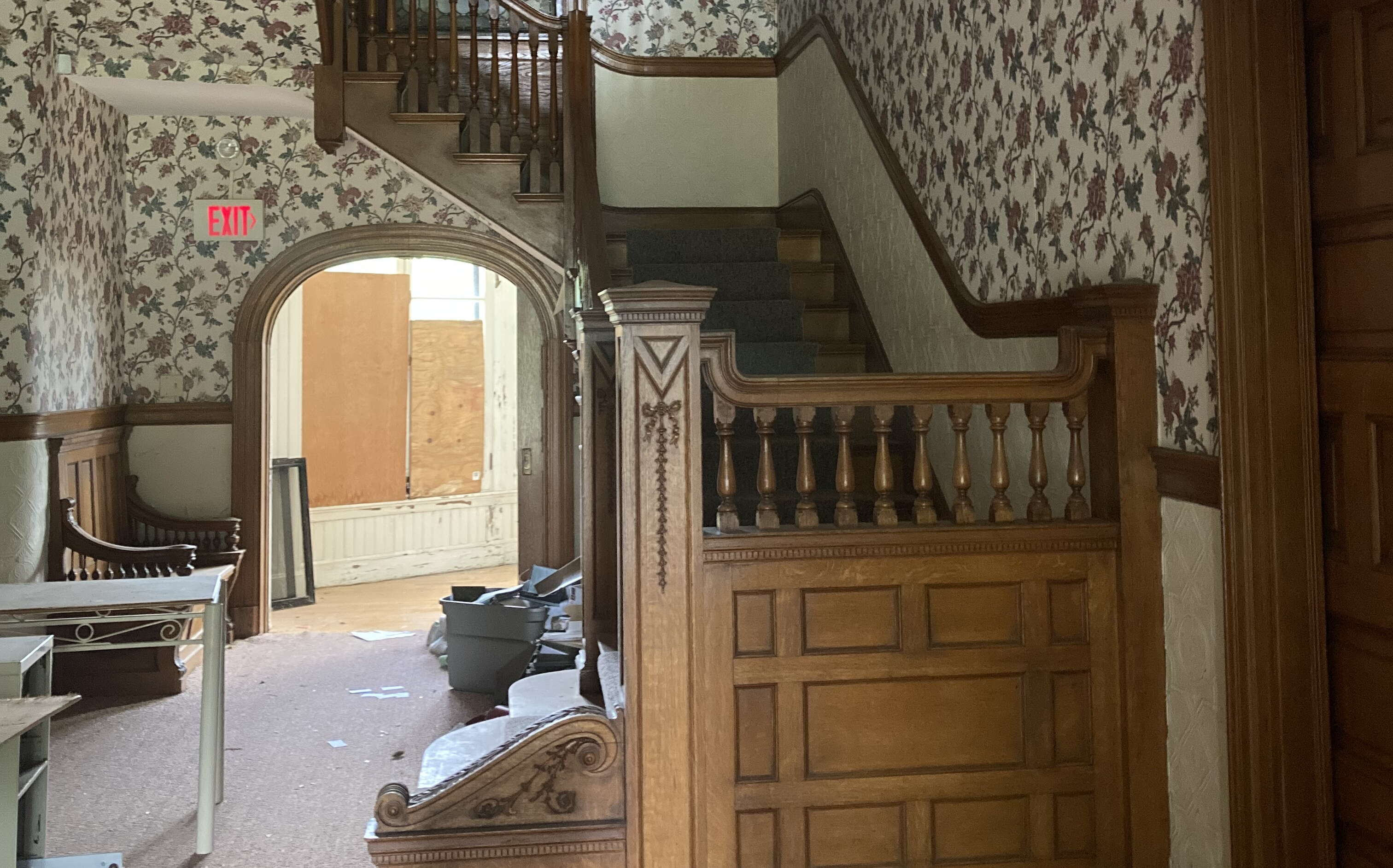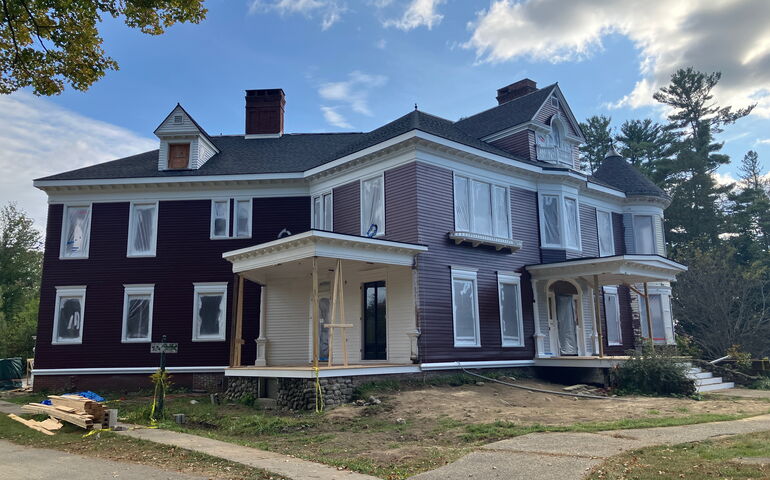
Processing Your Payment
Please do not leave this page until complete. This can take a few moments.
- News
-
Editions
View Digital Editions
Biweekly Issues
- December 1, 2025
- Nov. 17, 2025
- November 03, 2025
- October 20, 2025
- October 6, 2025
- September 22, 2025
- + More
Special Editions
- Lists
- Viewpoints
-
Our Events
Event Info
Award Honorees
- Calendar
- Biz Marketplace
Developer looks to community to help keep Bethel apartment project on track
 PHOTO / COURTESY, NORTHERN FOREST CENTER
The redevelopment of the historic Gehring House in Bethel is seen last month, when exterior painting was mostly completed.
PHOTO / COURTESY, NORTHERN FOREST CENTER
The redevelopment of the historic Gehring House in Bethel is seen last month, when exterior painting was mostly completed.
The $5.9 million redevelopment of Gehring House, a 19th-century Bethel home, into apartments is on track, according to the property’s owner, the Northern Forest Center, which recently launched a community campaign to raise the funds needed to complete the project.
The goal is to create housing to serve Bethel’s workers and families. For construction, the developers are using regionally produced wood products and hiring local trade professionals as much as possible.
The center is looking to the community to help raise $352,000 for the project, which will unlock a $250,000 challenge grant and complete the necessary fundraising.
The additional funds include $250,000 of architectural and engineering costs, $160,000 of demolition costs and a $75,000 contingency.
"We’ve secured major grants, historic tax credits and financing capital from our Northern Forest Fund to cover most of the project cost, but community contributions are key,” said Rob Riley, the center’s president.
Gehring House
The 10,000-square-foot, three-story Gehring House, on 10 acres at 77 Broad St., was built in 1896 for Dr. John Gehring, who had his clinic there. The house is listed on the National Register of Historic Places.
Work is underway to redevelop it into nine apartments ranging in size from two bedrooms to a studio. The apartments will have year-long leases.
The project came about after the center, the Maine Office Tourism and the Bethel Area Chamber of Commerce in 2019 convened local businesses, nonprofits and municipal leaders to discuss tourism trends in the area and changes the community would like to see based on those trends.
Northern Forest Center
The Northern Forest Center is an innovation and investment partner serving the Northern Forest of northern Maine, New Hampshire, Vermont and New York. The center has a business office in Concord, N.H., and Maine field staff in Millinocket, Bethel and South Portland.
Since its founding in 1997, the center says, it has secured or leveraged $240 million in investment and helped sustain or preserve 7,720 jobs. In 2023, it had assets of $23.7 million and net income of $1.2 million, according to its website.
In 2017, the center expanded its programming to include redeveloping underused properties to enable young professionals and families to find homes and contribute to rural communities.

The center bought the Gehring House in December 2022 to restore the building and reposition it as vital housing for the community.
The project is designed to comply with federal standards for historic rehabilitation. The building is considered one of the most architecturally and historically significant buildings in Bethel.
The center has been working in Bethel since 1997. Western Maine projects include improving recreation access and resources, providing workforce training, assisting wood products and tourism-related businesses, advancing sustainable tourism, developing community forests, expanding broadband service and building nonprofit capacity.
The project
The project includes all new mechanical, electrical and plumbing systems, interior and exterior finish work, sitework and landscaping, all while preserving the historical fabric of building and using National Park Service historic tax credits, Michael Cleary, Woodhull’s director of commercial construction, previously told Mainebiz.
Specifics include shoring up or removing exterior porches and decks, replacing oil boilers with wood pellet boilers, which will serve as the primary heat source, and conducting lead abatement throughout the building. The exterior will be painted “oxblood” deep red, similar to its original color.
Rent rates
“Having quality year-round rental housing available for teachers and trades people and shopkeepers and hospitality workers is a key component of retaining and attracting residents,” said Amy Scott, the center’s program manager.
The center uses several types of information to set rental rates.
“Our projects are designed to create housing for middle-income workers in the community,” said Scott. “We use the area median income to set a baseline, then consider other factors like the wages paid by area employers — particularly in health care, education, hospitality and manufacturing — to determine rental rates.”
Scott said the apartments are expected to become available in mid-2025, pending completion of fundraising for the project. The center said it would publicize rental information and the application process at a later date.
Local resources
The project uses wood products from the region and local contractors.
“We use a ‘wood first’ approach in our building renovations,” said Scott. “We’re salvaging and restoring as much of the original wood content as we can, and we’re adding new wood products such as wood-based insulation from TimberHP in Madison and a wood pellet boiler from Maine Energy Systems in Bethel.
"All our new framing lumber is from Hancock Lumber. Where we had to replace siding, we’ve used pine clapboards from Hancock Lumber’s mill in Bethel.”
Contractors have repaired and replaced some of the building’s sills, painted the exterior, completed plumbing and wiring and have begun insulating. On the grounds, contractors have fixed the perimeter drainage, and built the walkways, parking area, and the walking path behind the building.
Sheetrocking will start next, but only on new interior walls because the redevelopment of the Gehring House is a historic renovation. Any existing walls that need fixing will be repaired with plaster and lathe consistent with the original construction.
The general contractor is Woodhull, a Portland architecture, construction and millwork firm that has hired local talent throughout the project.
Subcontractors from Bethel include Michael Pelletier, who owns Clean Cut Painting, which is doing the interior and exterior painting; Jeremy Fredette, who owns Western Maine Roofing; Robie Wentworth of Wentworth Woodworking, which is making kitchen cabinetry and some matching built-ins; and Cross Excavation, founded by Jack Cross and now owned by Doug Jones.
“The original millwork in the building is amazing, and it’s great to see this historical building transformed into apartments,” said Wentworth. “Right now, it’s almost impossible for working people to find housing they can afford to buy or rent here.”
From around the region, Roger Arsenault owns Community Energy of Rumford, which is installing the plumbing, heating and HVAC systems; and Michael Carleton heads family-owned IEC, based in Strong, which is installing the electrical systems.
The Betterment Fund and the William Bingham Foundation, which both originated with philanthropists from Bethel, have provided early leadership support, along with other foundations and individuals.
Mainebiz web partners
Related Content

The Giving Guide
The Giving Guide helps nonprofits have the opportunity to showcase and differentiate their organizations so that businesses better understand how they can contribute to a nonprofit’s mission and work.
Learn More
Work for ME
Work for ME is a workforce development tool to help Maine’s employers target Maine’s emerging workforce. Work for ME highlights each industry, its impact on Maine’s economy, the jobs available to entry-level workers, the training and education needed to get a career started.
Learn More
Groundbreaking Maine
Whether you’re a developer, financer, architect, or industry enthusiast, Groundbreaking Maine is crafted to be your go-to source for valuable insights in Maine’s real estate and construction community.
Learn more-
The Giving Guide
The Giving Guide helps nonprofits have the opportunity to showcase and differentiate their organizations so that businesses better understand how they can contribute to a nonprofit’s mission and work.
-
Work for ME
Work for ME is a workforce development tool to help Maine’s employers target Maine’s emerging workforce. Work for ME highlights each industry, its impact on Maine’s economy, the jobs available to entry-level workers, the training and education needed to get a career started.
-
Groundbreaking Maine
Whether you’re a developer, financer, architect, or industry enthusiast, Groundbreaking Maine is crafted to be your go-to source for valuable insights in Maine’s real estate and construction community.
ABOUT
NEW ENGLAND BUSINESS MEDIA SITES
No articles left
Get access now
In order to use this feature, we need some information from you. You can also login or register for a free account.
By clicking submit you are agreeing to our cookie usage and Privacy Policy
Already have an account? Login
Already have an account? Login
Want to create an account? Register
Get access now
In order to use this feature, we need some information from you. You can also login or register for a free account.
By clicking submit you are agreeing to our cookie usage and Privacy Policy
Already have an account? Login
Already have an account? Login
Want to create an account? Register











0 Comments